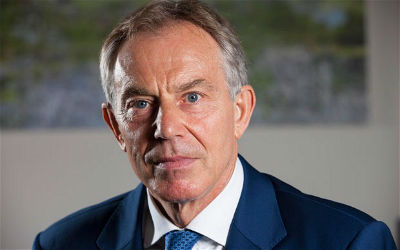Shravan Shukla 11, Kaliyug Varsha 5114
 |
United Kingdom : Under the benign influence at Oxford of the Anglican priest Peter Thompson, young Tony came to believe that faith and reason could be reconciled. From this he concluded that different faiths, especially the ”Abrahamic’’ religions of Judaism, Christianity and Islam, could build on what they have in common. Now he reads the scriptures of other faiths, and finds his own enriched. In particular, he reads the Koran.
”I see the Koran very much as an outsider. It stands in the great prophetic tradition of trying to return people to the basic principles of spirituality. Taken for its time, it was an extraordinarily progressive declaration of principle. It is also extraordinary for a Christian to read: for example, there are more references to Mary than in the Gospels. The tragedy is that it has been so warped and misapplied.’’
And here, Tony Blair has grown sterner. After September 11, 2001, he now thinks, he underestimated the power of the bad ”narrative’’ of Islamist extremists. That narrative – that ”The West oppresses Islam” – ”is still there. If anything, it has grown.’’ It seeks ”supremacy not coexistence’’. He fears that ”The West is asleep on this issue’’, and yet it is the biggest challenge. In Africa, all the good things he sees through his Africa Governance Initiative face ”this threat above all others’’. In ”Sudan, Mali, Nigeria, outbursts in Tanzania and Kenya’’, sectarian Islamist extremism is the great and growing problem. By implication, Mr Blair seems to doubt President Obama’s outreach to Islam, because it tends to deal with the wrong people. Since Obama’s Cairo speech in 2009, ”the whole context has changed’’. The Muslim Brotherhood is taking over large parts of the Arab world, and ”the people without the loudest voices are desperate for our leadership’’.
”We must engage, but also challenge,’’ he warns. The Middle East ”won’t achieve democracy unless it understands that democracy is a way of thinking as well as voting. The key question is how the majority treats the minority.’’ The West, he says, has been too slow to help the people of Iran: ”It is a great civilisation. The people would undoubtedly boot their government out at the ballot box if they could. It is important they know we are prepared to help them. A Persian spring would be very welcome.’’
But have you considered, I ask, that you might be wrong about Islam? What if it is not, at root, a religion of peace? He has thought about this but doesn’t accept it. He makes a comparison with Christianity. ”At Mass, at the end of the Bible readings, we say ‘This is the word of the Lord’. We now take it as the spirit of Biblical teaching. We don’t take every element of it as literal. That process took us a long time.’’ Islam is wrestling with the same process today.
Let’s bring the subject home: how does this apply to Muslims here? Mr Blair regrets that the ”Prevent’’ strategy which he devised became unfashionable. ”We mustn’t accept radicalism by accepting its narrative and disputing only its [violent] methods.’’
But he also believes that the anti-religion, Richard Dawkins crowd make everything worse. The extreme atheists ”require religious fundamentalists’’ to make their argument for them, so ”We must push back against aggressive secularism’’.
Source : Telegraph




